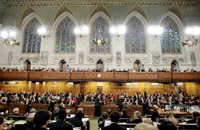
Canadian Prime Minister Paul Martin announced Tuesday that the 38th Parliament is dissolved and general election will be held on January 23.
Martin made the announcement at a news conference at the Governor General's House after he got the consent of Governor General Michaelle Jean.
"I have just met with the Governor General and she has agreed to dissolve the 38th Parliament. An election will be held on January 23," Martin said on Tuesday morning.
A non-confidence motion tabled by opposition Conservative and supported by New Democratic Party and Bloc Quebecois was passed Monday evening in the House of Commons, bringing down the Liberal minority government after its 17 months in power. In deference to constitutional tradition, Martin arrived at Rideau Hall in Ottawa in the morning to formally inform Jean that the minority government was defeated in a non-confidence motion and to request that Parliament be dissolved.
Martin and Jean had a brief chat at Rideau Hall before he emerged with the official election announcement.
Martin blamed the Opposition leaders for triggering an election during the holiday season, which he said most Canadians were against.
"I say to Canadians today, you have a stake in this, your vote will make a difference in this election, and in turn the result of this election will make a difference in your life, and in the life of our country," he said.
The Governor-General is expected to issue election writs for all 308 ridings, authorizing the election of each member of Parliament.
Party leaders are expected to set out on frozen election campaign trails almost immediately on Tuesday.
The non-confidence motion was passed Monday evening local time by a vote of 171 to 133 in the 308-member House of Commons. Harper tabled the motion last Thursday following Martin's refusal to the opposition demands to dissolve the 38th Parliament in January and hold election in mid-February.
The opposition has been taking advantage of the public anger with the sponsorship scandal involving the misuse of about 200million US dollars targeted for a national unity program in the French-speaking province of Quebec.
The investigation report, the first of the two, exonerated Martin of any wrongdoing but put most blame on former prime minister Jean Chretien and his senior Liberal members. Martin has repeatedly promised to call an election within 30 days of the release of the final report on the scandal which is due on February 1, meaning an election in April.
Martin's government was left in a free fall earlier this month when it lost the support of the NDP, whose backing helped Martin to survive the non-confidence motion by a single vote in May this year.
The opposition has claimed that the Liberal party lost the moral authority to lead the nation after a judicial report confirmed Liberals were involved in a federal sponsorship scandal earlier this month.
Although Canadians are hoping for a more stable majority government, recent polls show that most of them expect a minority one, with Liberals having a better chance to win. A Pollara poll released on Monday showed public support for the Liberals at 36 percent, compared with 31 percent for the Conservatives. Parties typically need to win more than 40 percent of the vote to gain majorities in parliament.
Because Canadian parties do not form coalitions, minority administrations need opposition backing for passage of laws. Another informal alliance between the Liberals and the NDP may be the most likely outcome in the January vote, observers said.
(Xinhua News Agency November 30, 2005)
|

